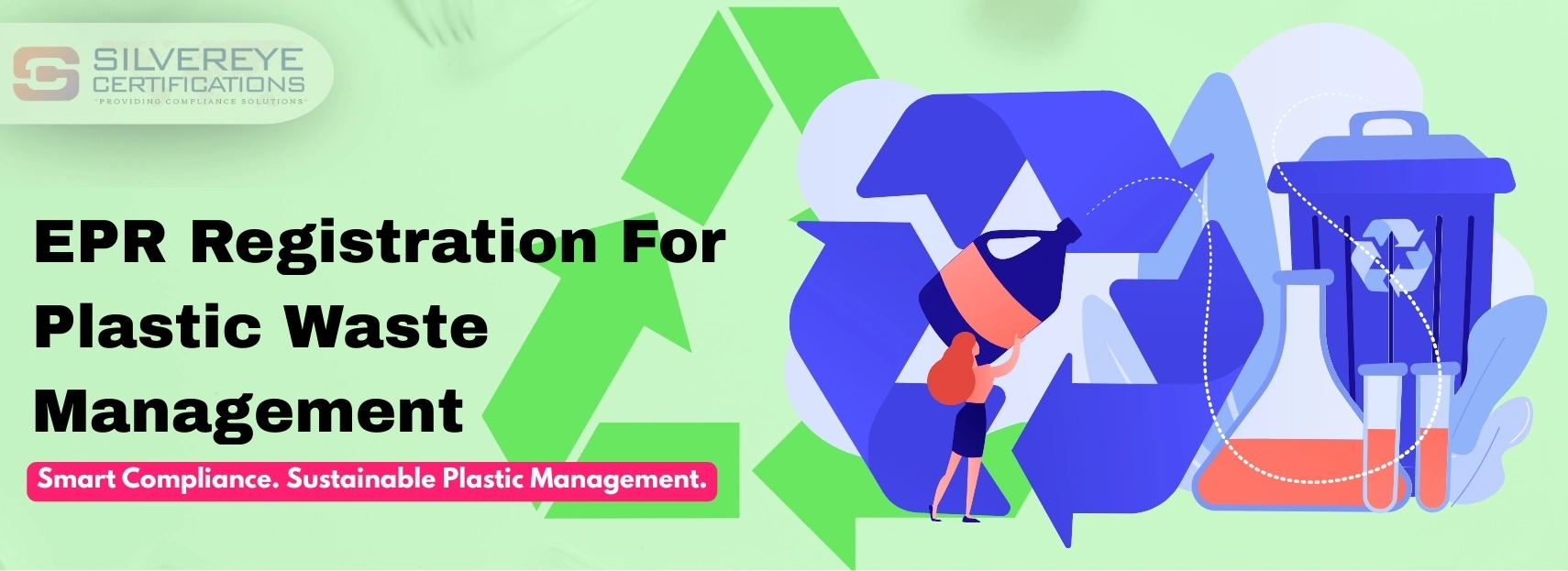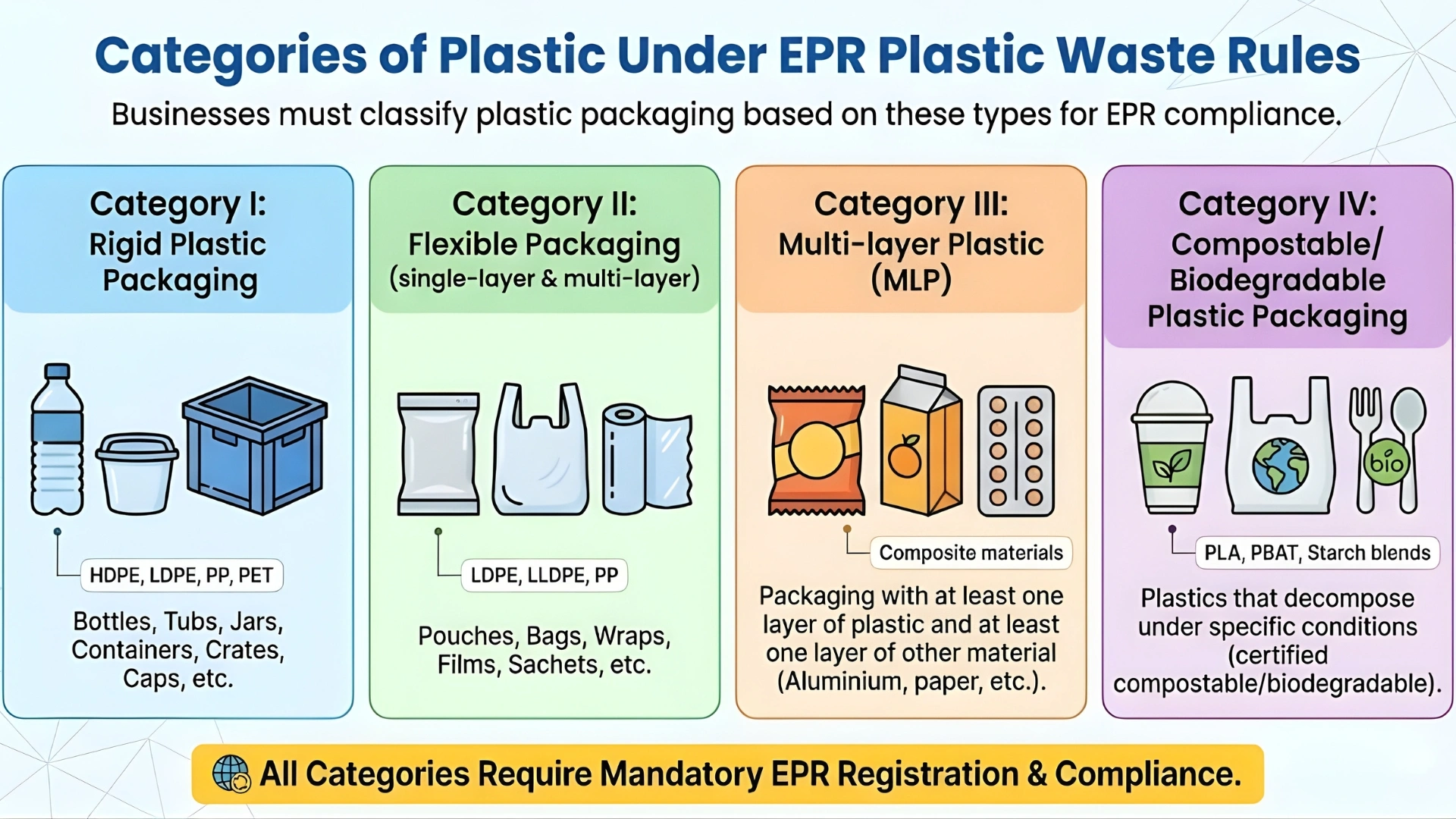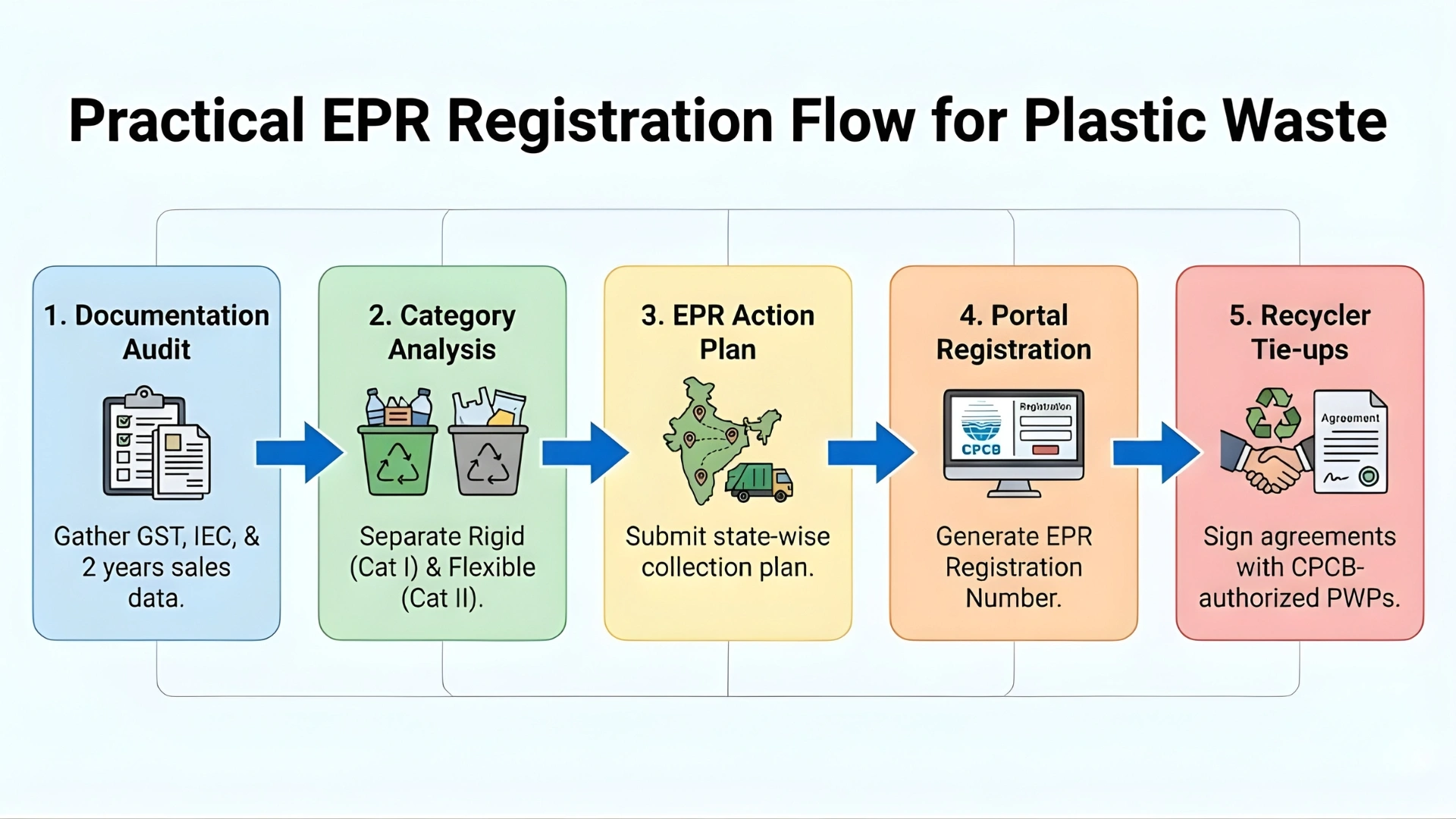Any Producer, Importer or Brand Owner (PIBO) using plastic packaging to sell products in India must register on the CPCB EPR Portal.

A few months ago, a well-known FMCG brand approached us in Delhi with a problem that’s becoming increasingly common. Their products were flying off shelves nationwide, but their plastic packaging volume had crossed the CPCB threshold, and their distributors had started asking for the EPR Plastic Waste Certificate.
The brand assumed it was just another regulatory formality. But within weeks, they realized not having EPR Authorization had paused their supply approvals from major marketplaces and state pollution departments. Procurement teams refused purchase orders, mentioning non-compliance under EPR Plastic Waste Management Rules 2016 (amended 2022 & 2024).
Their story is not unique. Most producers, importers, and brand owners only understand the urgency of EPR for plastic waste when big orders get stuck. The intent of legislation is clear:
Businesses that generate plastic waste must take responsibility for collection, recycling, and end-of-life disposal.
And that is where a reliable EPR Registration consultant in Delhi or anywhere in India becomes crucial—not only to obtain authorization but to align every document and recycler partnership properly to avoid future penalties.
EPR Plastic Waste Management is a regulatory framework under India’s Plastic Waste Management Rules that makes businesses responsible for the entire lifecycle of plastic packaging they introduce into the market. Instead of treating waste disposal as the responsibility of the consumer or municipal bodies, the law shifts accountability to the companies that manufacture, import, or sell products packed in plastic.
India generates millions of tonnes of plastic packaging waste annually. A huge proportion ends up in open dumps and landfills. CPCB and MoEFCC introduced EPR Plastic Waste Management Rules to stop this cycle by ensuring:
The most important effect is the rise of circular economy practices—not burning, dumping, or landfilling, but reusing and recycling materials back into the system.
Many companies still believe the rules apply only to plastic manufacturers. Reality is broader. Anyone placing plastic packaging into the Indian market must register.
| Category | Covered Entities |
|---|---|
| Producers | Manufacturing plastic packaging |
| Importers | Importing products packed in plastic |
| Brand Owners | Selling brands using plastic packaging |
| Online/Marketplace Sellers | E-commerce distributing packaged products |
| PIBOs | Producers, Importers, Brand Owners collectively |
| PWPs | Plastic Waste Processors / Recyclers |
If a business avoids CPCB EPR Plastic Registration, it cannot legally introduce products in the Indian market and will face penal actions under Environmental Protection Act.
Businesses don’t only register—they also classify plastic based on packaging type.
| Category | Packaging Type |
|---|---|
| Category I | Rigid Plastic Packaging |
| Category II | Flexible Packaging (single-layer & multi-layer) |
| Category III | Multi-layer plastic (MLP) |
| Category IV | Compostable/Biodegradable Plastic Packaging |
Understanding categories is essential to calculate annual EPR targets and recycled content obligations.

Effective July 1, 2025, the Plastic Waste Management (Amendment) Rules mandate that all registered plastic packaging must carry a scannable QR Code or Barcode.
This code must instantly reveal:Strict Penalty: Non-compliance after the deadline will result in the immediate seizure of stock and potential suspension of your EPR Registration. Ensure your packaging vendors are updated on this requirement immediately.
The Environmental Compensation (EC) regime has been framed by the Central Pollution Control Board (CPCB) to penalize violations of the Plastic Waste Management (PWM) Rules, 2016. The system follows the “Polluter Pays Principle” and applies to all entities who fail to comply with PWM obligations.
The guideline was developed in compliance with directions of the National Green Tribunal (NGT) and is applicable across CPCB, State Pollution Control Boards (SPCBs), Pollution Control Committees (PCCs), and Local Bodies.
Below is a clear and fully informative summary of the “Guidelines for EC (Environmental Compensation) Assessment for violation of Plastic Waste Management Rules, 2016” issued by CPCB, based strictly on the officially issued document.
| Violation Type | Penalty Amount (Approx.) | Action |
|---|---|---|
| Non-Registration | ₹5,000 - ₹10,000 per ton | Immediate Stop Work Notice |
| Shortfall in Recycling | ₹5,000 per ton (Cat II/III) | Assessment + Interest |
| Use of Banned SUP | ₹20,000 per violation | Seizure of Goods |
| Misreporting Data | Double the Application Fee | Registration Suspension & Audit |
The EC framework ensures:
This was formalized following the amendment notifications to PWM Rules (2021, 2022) and the NGT direction dated 08.01.2021.
CPCB identifies frequent non-compliance areas, including:
This list is provided in Table 1 of the guideline.
CPCB calculates EC based on the estimated cost of plastic waste management per ton, which includes:
The total cost works out to around ₹4000 per ton, shared equally between:
To act as a deterrent, the EC is 2.5× this cost → ₹5000 per ton of plastic waste.
CPCB provides a detailed enforcement matrix showing:
| Violation | Entity | Action / EC |
|---|---|---|
| Carry bags below permitted microns | Producer | Seizure of products + ₹5000/ton (1st violation), ₹10000/ton (2nd), ₹20000/ton (3rd) |
| Prohibited SUP manufacturing | Producer | Revocation of Consent + ₹5000/ton onwards |
| SUP stocking / selling | Commercial outlets | Fines from ₹2000 to ₹10000 + licence cancellation |
| No PWM infrastructure | Local bodies | ₹5000/ton PW shortfall since 18 March 2016 |
| No EPR Registration / shortfall in EPR targets | PIBOs | ₹5000/ton deficit for 1st instance; escalates for repeated violations |
| Misreporting by recyclers | PWP | ₹5000/ton (1st), ₹10000/ton (2nd), ₹20000/ton (3rd) |
The Government of India has updated the Plastic Waste Management Rules, 2016 to strengthen registration, monitoring and accountability of all stakeholders dealing with plastic packaging.
All Producers, Importers, Brand Owners (PIBOs), Plastic Waste Processors (PWPs), and manufacturers/importers of plastic raw material must register only through the centralised CPCB online portal.
Selling or supplying plastic raw material or packaging to any unregistered unit is prohibited. Only entities registered on the CPCB portal can trade plastic.
Registration is now compulsory for:
Annual and quarterly reporting must be done only through the CPCB online reporting module.
Local bodies and district bodies must also file annual reports online by 30 June every year.
Plastic packaging, compostable plastic, and biodegradable plastic have been given separate category definitions for target calculation and certification.
Each packaging type (recycled, compostable, or biodegradable plastic) must carry the correct certified label and IS Standard marking before sale.
CPCB may authorise approved digital trading platforms for exchange of EPR certificates. CPCB will fix minimum and maximum market prices for certificate trading.
Clients often get overwhelmed looking at long CPCB checklists. Here’s the most practical breakdown used during consulting:

Required documents include:
Strong documentation analysis increases the approval success rate dramatically.
| Stage | Activity | Expected Duration |
|---|---|---|
| Stage 1 | Document verification & packaging assessment | 3 – 5 working days |
| Stage 2 | Filing of application on CPCB EPR Portal | 2 – 4 working days |
| Stage 3 | Response to CPCB queries / clarifications (if raised) | 10 – 20 working days |
| Stage 4 | Approval & issuance of EPR Registration Certificate | 30 – 45 working days |
Overall approval timeline: 30 – 60 working days depending on documentation, packaging category & business size.
| Business Category | Validity Duration | Remarks |
|---|---|---|
| Producer (Plastic Packaging) | Continues until compliant | Validity remains active if filings and targets are met |
| Importer | Valid for each financial year | Renewal required yearly |
| Brand Owner | Valid for each financial year | Based on reporting & target fulfilment |
| Plastic Waste Processor / Recycler | Up to 3 years or as per licence | Capacity reports must be updated |
| Requirement | When It Is Required | Conditions |
|---|---|---|
| Application for renewal | Before end of financial year | Must be filed on CPCB EPR Portal |
| Annual returns filing | Mandatory | No renewal accepted without this |
| Target fulfilment proof | Mandatory | Valid plastic credit documentation needed |
| Updated business documents | If any details have changed | Must match latest licences & registrations |
| Cost Component | Based On | Notes |
|---|---|---|
| Compliance & filing service fee | Business size, SKU count & documentation workload | Charged by consultants / service providers |
| EPR fulfilment cost | Annual plastic packaging volume & category (rigid, flexible, MLP etc.) | Includes purchase of recycling credits from registered PWPs |
| Operational cost of returns | Frequency of quarterly & annual filings | Depends on business activity level |
| Testing / certification (if applicable) | For compostable or biodegradable packaging only | Not applicable to regular plastic packaging |
Silvereye Certifications ensures not just EPR registration, but end-to-end compliance so your business operates without the risk of penalties, certificate suspension or marketplace approval delays
EPR Plastic Waste Management is no longer a goodwill initiative. It is a mandatory compliance framework that influences business continuity, marketplace approvals, investor confidence, and supply-chain selection. Any producer, importer, or brand owner placing packaged products in the Indian market must secure EPR Registration for Plastic Packaging through the CPCB portal and maintain ongoing compliance for recycling targets.
If the next audit cycle, tender requirement, or marketplace onboarding is time-sensitive, delaying EPR filing increases business risk. A professional consultant ensures zero-error documentation, recycler onboarding, timely filings, and long-term compliance safety.
To simplify your EPR Plastic Waste Authorization with expert support, share your business details and packaging type. Assistance is available across India.
Any Producer, Importer or Brand Owner (PIBO) using plastic packaging to sell products in India must register on the CPCB EPR Portal.
Yes. No business can legally sell packaged products without valid EPR registration and yearly compliance.
Companies must meet annual recycling targets, upload plastic credit proofs, and file quarterly/annual returns on time.
Non-fulfilment leads to Environmental Compensation (EC), suspension of registration and marketplace/tender restrictions.
Typically 30–60 working days when documents and packaging details are accurate.
Yes for most PIBOs. Renewal is based on yearly returns and 100% fulfilment of recycling targets.
Consultants help with accurate filing, correct target planning, verified recycler tie-ups, timely returns and audit-ready documentation.
Silvereye manages registration + recycler onboarding + filings + renewals, ensuring brands remain penalty-free and business-ready throughout the year.
At Silvereye Certifications & Consulting Services Pvt. Ltd., we simplify compliance and certification processes, guiding you to achieve and maintain required industry approvals with complete trust.
IMPORTANT DISCLAIMER: Silvereye Certifications is a private consulting firm. We do NOT issue government certificates, licenses, or official documents. We provide professional consulting services to help businesses navigate the application process for government certifications. All certificates and approvals are issued solely by the relevant government authorities.